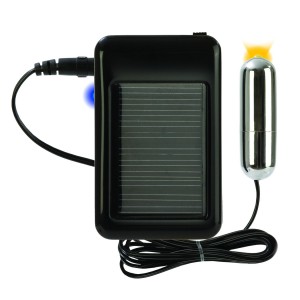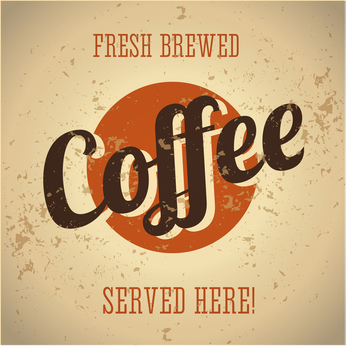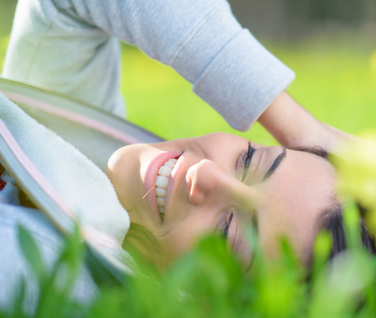Going Green Part 2: The Solar Bullet
I’ve got an update for all of you earth-conscious souls out there; Micro-Kitty, the solar-charged vibrator, has some competition — the Solar Bullet! I’ve gotta admit; the names are almost as creative as paint and nail polish colors!
 Regardless, the Solar Bullet vibrator offers two hours of pleasure at the price of 8 hours of sun exposure. Detractors say that the ‘vibes’ are too concentrated for them to derive much pleasure while fans of the Bullet say that it’s great for travel since it can get off on any light source (pun intended). The energy pack itself, while pretty discreet, is about the size of a mini-iPod and frankly, looks like military gear (beware of the TSA agent who decides to take it out of your purse at Security!). An extra bonus is the LED light at its tip, which I guess, comes in handy if you can’t see the keyhole in the dark (holy hell, those puns just keep coming and er….there I go again!).
Regardless, the Solar Bullet vibrator offers two hours of pleasure at the price of 8 hours of sun exposure. Detractors say that the ‘vibes’ are too concentrated for them to derive much pleasure while fans of the Bullet say that it’s great for travel since it can get off on any light source (pun intended). The energy pack itself, while pretty discreet, is about the size of a mini-iPod and frankly, looks like military gear (beware of the TSA agent who decides to take it out of your purse at Security!). An extra bonus is the LED light at its tip, which I guess, comes in handy if you can’t see the keyhole in the dark (holy hell, those puns just keep coming and er….there I go again!).
I’m all for conservation but somehow, this design seems all wrong. I’ve not tried it so I may be shooting in the dark here, but even the eco-friendly box, which is printed to environmentally responsible Forest Stewardship Council approved standards isn’t enough to convince me to go green to this extreme.
Read MoreGuyside: Old-school wasn’t always bad school
I don’t own a cottage — although I am quite happy to be invited to other people’s! When we started to get on top of our mortgage and cash flow, and something like a recreational property became an option, my partner and I opted for investing in our back yard instead, and we now call it the cottage.
She’s in charge of the garden and I lend brute strength and occasional good ideas; I’m in charge of drinks, food, and keeping the little patch of grass, the stonework, and anything else that needs maintenance maintained. We’re happy with our choice. We tell people “we can barely keep up with one house — what would we do with two?!”
But … I grew up with a “cabin” (that’s what we called it, not a “cottage”, although sometimes it was “the bungalow”) a few miles from our house. What I remember from my childhood is roaming through the little patches of forest with an air rifle and plastic Viking figures that were in my mom’s bags of puffed wheat, setting up shooting galleries and practicing my aim, swimming in the clear salt water of the Bras d’Or Lake, playing with giant inner tubes that my dad got hold of from somewhere, bonfires with toasted marshmallows, and my dad working.
My mom worked when we were out there, but her work never seemed as hard to me as dad’s work. Mom worked on keeping us all fed and watered, on getting bug spray applied, at planting a few flowers here and there, at welcoming friends and family when they’d pull up. But dad… There was a marshy section of the property, and he worked to dry that out and clear it, seed it, and turn it into something you could walk on. Wheelbarrow loads of fill and soil. I first remember actually getting to the lake holding on to a rope that helped you down the fairly steep bank. Then there was a staircase, and then a nicer staircase. My dad would take a swim, but then he’d put on an old pair of sneakers and grab a pry bar and start moving rocks to make a bigger swimming area. When the grass needed to be cut, it wasn’t a ride-on mower, it was a push mower, its motor roaring, its wheels being adjusted to accommodate the rough terrain and stumps and rocks and roots. When it came time for the bonfire, it was he who built the fire, and it was he who would tend it with a long steel poker, making a place where the coals glowed for the best marshmallows.
He worked way harder than I’d be prepared to do at my age. And he did that after a week’s hot, sweaty work at a steel plant. His brother was another steel plant LeDrew — they almost all were — and when his emphysema got to be too much to let him work at his cottage, he stopped going rather than watch his children do what he saw as his job.
We live in an era of specialization and technology. I grew up helping my dad change our car’s oil and do basic maintenance. Much of what we did simply can’t be done on modern cars. Our back yard was landscaped by others. When our dishwasher broke recently (DISHWASHER, my dad would scoff, were he here…) I tried and failed to fix it. In came the specialist.
Our cabin didn’t have any pretensions. It didn’t even have plumbing. The beach wasn’t an endless expanse of honey-coloured sand. But I hope that my dad looked at it with the pride of someone who had used his muscles to make something. That’s what men like him did.
It’s difficult to muster a similar sense of pride over some glowing pixels. Sometimes, there was a nobility and a simplicity about how things were that I’d like to try to recapture now. How about you?
Read MoreAromatherapy and menopausal symptoms; what’s the 4-11 on neroli oil?
[Photo credit: Los Angeles Arboretum]
Stress. Lord only knows that it wreaks havoc on our bodies and on our moods. And when it’s exacerbated by the tide of hormones that wax and wane over menopause, it can take an enormous toll. Importantly, the essential oil of the bitter orange tree (Citrus aurantium L. var amara), better known as neroli oil, has been shown in animal laboratory studies to reduce anxiety and depression. However, does it work in humans as well?
In a study published in Evidence-Based Complimentary and Alternative Medicine journal, researchers assessed if inhaled 0.1% or 0.5% neroli oil might relieve the psychological symptoms of menopause, i.e. stress, depression and anxiety. While the study included less than 100 women, it was a scientifically controlled trial and the women, all of whom were in menopause, healthy, and not using meds for their mental health were randomized to neroli oil dissolved in almond oil or to almond oil only.. They were asked to inhale either preparation for 5 minutes twice a day for five days. Measures of sexual desire, stress, quality of life, blood pressure and pulse rate and blood serum and estrogen were taken at the start of the study and the day after.
Interestingly, inhaling neroli oil significantly improved physical menopausal quality of life scores compared to inhaling the almond-only oil. The 0.1% formulation also had a significant effect on vasomotor symptom scores. While stress levels were shown to decline in all three groups, the differences were not scientifically significant. And while the neroli oil did help to improve cortisol levels, it had no effect on estrogen. However, it did appear to significantly reduce blood pressure.
Aromatherapy is a practice that is not taken very seriously among medical practitioners yet it’s important to note that neroli oil interacts with the very same neurotransmitters that play a role in regulating body temperature (i.e. the 5-HT receptors). Hence, it is not surprising that in this study, the 0.1% dose significantly improved vasomotor symptoms, Moreover, while the neroli oil did not appear to reduce stress, it did have a positive, significant impact on blood pressure measures, which indicates a role in relieving the body’s cardiovascular responses to stress. The researchers say that neroli oil’s influence on blood pressure might be due to how it interacts with the autonomic nervous system, which among many functions, controls heart rate and breathing.
While neroli oil can have side effects when it is ingested, I have been unable to find similar reports when a small amount (i.e. two drops) is rubbed on the skin and then used as aromatherapy. Nevertheless, you should speak with a licensed, knowledgable practitioner before trying this strategy as people as rubbing it on the skin may cause allergic reactions and does risk that some of it will be absorbed, thereby causing a drug reaction. Most importantly, one study does not proof make. Be vigilant and let’s see if there are other reports in greater numbers of women.
Read MoreSex Shaming Has No Age Limits: Guest Post by Walker Thornton
A few weeks ago I wrote a piece in response to a Huff Post article about aging and cloaking and sex in midlife. That topic reared its head again this week in a Facebook group and I was fortunate to be turned onto a brilliant post by fellow writer, Walker Thornton. For those of you who are unfamiliar with Walker or her work, she is a writer, sex educator and public speaker, and is entrenched in midlife women’s sexuality. I encourage you to visit her website. And please, show some love; this is an important topic that deserves attention and dialogue. I am honored to feature it on Flashfree.
[Nu (Nu debut). Artist: Jean Metzinger, 1911]
Why is it that some women feel compelled to shame other women? To label their activities as slutty and dismiss their stories? It has happened to me and other women writers I know; it seems to occur when we choose to be open about our sex lives. There will always be some self-appointed know-it-all ready to shame, judge or blame and then tell women what they “should” do. There are no shoulds when it comes to sex…unless we’re talking about protection from disease and safety. And, even then, who invested me or you with the power to force our opinions on someone else?
I’m fuming this morning over some of the conversations spurred on by an article Robin Korth wrote about a dating encounter. Things were going well until they got to the sex part and then 55 yr old Dave (she doesn’t share what he looks like) became completely turned off by the body of the similarly aged woman he was about to have sex with. Dave clearly has issues. He wanted her hair to be longer, he wanted her to wear the little black dress, he had to have sex with her in the dark so he could pretend she was young. A man with issues. She chose not to give into his demands and her story has provoked many people. Some people were irritated by her description of her size 6 body. One older woman said that mature women should never show their naked bodies to a man…we’ll never have sex again (what Kool Aid is she drinking?). And of course there was male-bashing.
We live in an ageist culture, surrounded by myths, put-downs and advertising promises all designed to make us feel dissatisfied with ourselves at a given age. This is really on my mind as I approach 60 in a matter of days–single and on a dating site. I’m not going to lie about my age and I’m not going to reach out for pills and injections or surgery to try to erase the years. Admittedly it’s hard to look in the mirror sometimes and see the changes in my body but I consider myself blessed to have made it this far in life, relatively unscathed.
I don’t intend to let anyone dictate how I show up for sex or work or walking down the street. And, I hope you won’t either.
We bring ourselves to every situation, every relationship just as we are. And, we’re accepted for that or we’re not. Those who can’t see our true beauty aren’t worthy of being in our lives. Isn’t it that simple? If any one person is judging us or telling us what we have to wear, or how to ‘show up’ they aren’t really seeing us. And clearly that person isn’t the least bit interested in true engagement. That’s where we get to exercise our choice–to pursue a fuller life, to find a more compatible partner, to let go of a ‘friend’ who no longer supports us. We can choose who comes into our life. We can invite or deny access to our bed.
One of the conversations that got under my skin had to do with letting men see our naked bodies. It was suggested that mature women shouldn’t let a man see them naked. Why on earth would a woman want to have sex with a man who couldn’t bear to see her body? Should she hide in the dark, keeping her beautiful, aging body cloaked as if it were a thing of shame?
The best sex you’ll ever have is Naked Sex.
Naked Sex is sex where both parties are willing to drop their protective armor and allow themselves to become fully immersed in the experience. There is no subjugating our own desires to make sure he’s happy. No hiding because you fear he/she won’t like your body. No manipulation, no coercion.
Naked Sex is about showing the real you. You can be naked or sensuously draped in lingerie that excites your senses. Both of you take ownership of your own desires and needs. You are able to communicate with each other and willingly enter into a moment of sexual pleasure. It’s when we find each other to be equally engaged and desirous that we have the most satisfying experiences.
Feel free to share your thoughts in a civil, sex-positive manner. No sex shaming here!
About Walker Thornton…
Walker Thornton is a writer, sex educator and public speaker. She is a strong advocate for midlife women’s sexuality, encouraging women to ‘step into their desire’. Kinkly.com ranked her blog, WalkerThornton.com, #17 in their top 100 Sex Blogging Superheroes of 2013. Walker is the Sexual Health columnist for Midlife Boulevard and writes about sex and the older adult for Kinkly.com. You can connect with her on her website (www.walkerthornton.com ), Facebook (https://facebook.com/AWomansPage ) Twitter (http://twitter.com/WalkerThornton) and Google+ (https://plus.google.com/u/0/+WalkerThornton/posts ).
Read More
Guyside: Breaking good
 I’m a pretty lucky person. While my life isn’t perfect, I have many advantages, and I’m thankful for them. It’s easy to forget about that when you get focused on some problem or other.
I’m a pretty lucky person. While my life isn’t perfect, I have many advantages, and I’m thankful for them. It’s easy to forget about that when you get focused on some problem or other.
But sometimes good enough shouldn’t be, you know?
Think about Walter White, a/k/a “Heisenberg” of Breaking Bad. He was a guy who had a “good enough” life — wife, son, baby on the way, a steady job that is respected, if not well-paying… and then a diagnosis of terminal lung cancer shattered everything in his life and forced him down a radically different path.
I’d be perfectly happy if not one person ever got diagnosed with lung cancer. And, for that matter, if people stopped making and using crystal meth. But I think that we don’t have to “break bad” — why not “break good?”
I’ve been trying to change some of my routines recently. For example, since I work from home I do most of the dinner preparation for the household. It’s the sort of thing that can make a break from staring at the computer or talking on the phone. And, like most people, I have a repertoire of dishes that I know well enough to essentially make without a great deal of thought.
So to break that up, I’ve started to search out new recipes, new ideas. It’s fun to try (especially when they work out well), and it breaks me out of the cooking rut and both me and my partner out of the taste-rut. Example: it being summer, coleslaw is a natural side dish for things we cook on the BBQ. I was used to buying bagged coleslaw from the store, then dressing it with a commercial dressing. Somehow I realized that hey, coleslaw’s just a few shredded veggies. So I started making my own. Then I tried some dressing recipes. WAY better than before. (FYI: I’ve become quite fond of this dressing recipe, with a few variations. Try it.)
I’ve changed other things recently too. I love beer. But having that end-of-day beer or the beer with supper, or the finished-the-yard-work beer can become a little … routine. So for a few weeks now, I’ve haven’t been bringing beer into the house. Now, when I have beer — like I did yesterday during an end-of-day business meeting, or like I did when I was visiting family recently — it’s DELICIOUS. At some point, I’ll likely restock the fridge, whenever I get the desire to do so.
There are all sorts of little routines that we establish in our lives. Many of them are there for very good reasons. We get up and shave and shower because we like being clean. We brush our teeth because we want our breath fresh and we don’t like cavities. But changing habits can be good for you. It stimulates your brain. It can make you think about the reason behind the habit. And that’s never bad.
Look at the routines of your day — the way you interact with people in your life, what you eat, drink, how and when you exercise, your activities, your leisure, your work. Pick one to play with, to try to change.
A lot of meditation practices focus on mindfulness — on simply being aware of your circumstances. If you feel good, note it. If your knee is sore, note that. If you want another cup of coffee, be aware of the desire. Assessing the little routines, experimenting by breaking one of them for good, and seeing if it improves your daily life — that’s part of mindfulness too. And failing is part of changing habits too. If you don’t like a change, or you can’t stop biting your nails, or whatever — just note that. Don’t beat yourself up over it.
Try it, just for fun.
Read MoreVaginal atrophy: an alternative to hormones
I have been a bit disturbed by the surge of attention in the menopause space to vaginal atrophy, i.e. thinning and drying of the lining of the vagina. Mind you, I don’t feel that impact that vaginal atrophy can have on a woman’s life should be marginalized, however, when I see my colleagues racing to write about hormones and ending the silent suffering of tens of thousands of women, all I can do is shake my head in disbelief; you see, my space is not for sale to any bidders. Let me be clear: vaginal atrophy affects roughly 43% of women during menopause and can lead to extreme discomfort, dryness, burning, itching, pain and lack of sexual desire. Since most women spend about a third of their lives in postmenopause, this can be a huge issue and one that warrants attention. However, to represent vaginal atrophy as an epidemic of epic and burgeoning proportions is simply irresponsible.
As I step off my soapbox, let me share the true reason for this post: Finnish researchers have discovered a potential treatment for vaginal atrophy for women who cannot use or choose to forgo systemic or topical estrogen therapy — sea buckthorn oil. Sea buckthorn oil is derived from the fruit of deciduous shrubs and has long been used in Central Asia to treat inflamed genital organs and uteri. When it is ingested, it has been shown in clinical studies to positively affect blood fats, dry eye, the aggregation of platelets that can cause heart disease and even reduce system-wide inflammation. Woo-woo? Hardly; my point is that sea buckthorn oil has been studied in scientifically-sound, clinical trials.
In a study published online in the journal Maturitas, 116 women were asked to take sea buckthorn oil (3 capsules, or 3 gm daily) or placebo for three months. Vaginal mucous membranes were examined both at the beginning of the trial and at the end and were analyzed for elasticity, integrity, moisture and fluid. The women were asked to score the severity of their symptoms — vaginal dryness, burning and itching — at the beginning, middle and end of the trial and also and also kept diaries on other menopausal symptoms.
Sea buckthorn oil was shown to significantly improve the integrity of the vaginal lining by about 50% compared to placebo; women taking the oil trended toward increases in their vaginal health index, which was a composite of all vaginal atrophy symptom scores (i.e. elasticity, integrity, moisture, fluid and pH). Sea buckthorn oil also appeared to decrease night sweats but did not appear to benefit other menopausal symptoms. Moreover, while the women taking the oil experienced improvements in their vaginal symptoms from the start to the end of the study, the difference compared to placebo was not significant enough to demonstrate the lack of a placebo effect and clearly, more research is needed. Another important finding was the lack of effect on cell types, which indicates that sea buckthorn oil does not have an estrogen effect. Finally, common side effects, which affected both groups about equally, included GI symptoms. Because sea buckthorn oil may slow clotting, it is not recommended that it be taken along with other agents that likewise, affect clotting, such as aspirin, ibuprofen and warfarin.
It is unclear whether or not topical use of sea buckthorn oil might provide greater comfort without some of the GI side effects. A quick search shows that it is readily available online and depending on the formulation, retails for anywhere from $12 to $30. As always, use caution and speak to a knowledgeable practitioner before starting any regimen with sea buckthorn oil. Most importantly, it is nice to know that researchers continue to explore avenues other than hormones for common conditions like vaginal atrophy.
Read More
Caffeine and hot flashes
 True confession: I hated reading this study and I truly dislike the findings. But I feel obligated to share what I’ve learned about caffeine and menopause, if only to provide you with additional options for symptoms management. If you are a long-time reader of Flashfree, you will remember that I’ve previously covered the health benefits of coffee so the news isn’t all that bad. However, if you are experiencing frequent hot flashes and night sweats, you may want to considering cut down on your daily consumption.
True confession: I hated reading this study and I truly dislike the findings. But I feel obligated to share what I’ve learned about caffeine and menopause, if only to provide you with additional options for symptoms management. If you are a long-time reader of Flashfree, you will remember that I’ve previously covered the health benefits of coffee so the news isn’t all that bad. However, if you are experiencing frequent hot flashes and night sweats, you may want to considering cut down on your daily consumption.
Recently, researchers at the Mayo Clinic in Rochester, MN surveyed over 1,800 women who visited the clinic for menopausal complaints. The women were asked to respond to a scientific survey — the Menopause Health Questionnaire — that assesses a variety of important factors such as demographics, reproductive/gynecologic histories and the presence/severity of symptoms. With regard to caffeine intake, the women were asked if they consumed drinks with caffeine (e.g. coffee, tea, soft drinks) and current smoking status was also evaluated. Because of the subjective nature of pre- and perimenopause, these women were grouped and then compared to women who were in full menopause.
Although the use of self-reported questionnaires always introduce possible bias for skewed study findings, it’s important to note that compared with women who did not use caffeine, caffeine users scored higher for vasomotor symptoms. Moreover, even after the researchers accounted for possible confounding factors such as smoking and menopausal status, ingesting caffeinated beverages was still significantly associated with an increase in bothersome hot flashes and night sweats. Evidently, caffeine use did not affect other common symptoms, such as sleep issues or sexual function).
A possible explanation lies with way that caffeine possibly interacts with the body’s estrogen; for example, it may inhibit an enzyme that converts the hormone androgen into estrogen. Another theory is that is affects the levels of other sex hormones, such as testosterone. Regardless, if you are experiencing frequent hot flashes and night sweats and have come to your wit’s end, you may want to consider how you are using caffeine. Breaking up is hard to do but it may save you a drop or two of that sweaty, hot stuff!
Read More










